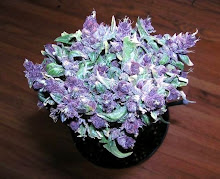I’ve been writing for nearly a year, and still I haven’t yet focused on the idea of marijuana as medicine. That’s mainly because up until a few months ago, I actually sided with ex-Drug Czar John Walters when he said in 2003 that medical marijuana made as much sense as “medical crack.” I felt then, and still do now, that by looking at cheeba as medical issue, we gloss over the more important civil rights and security issues that I’ve tried to cover in previous columns.
But one simply can’t pay attention to the ongoing marijuana debate as closely as I do and continue to believe that administering crack rocks from the local bathtub-lab to patients has the slightest similarity to suggesting they puff leaf of Mother Nature’s homegrown bounty.
As for me, I credit cannabis with helping me overcome long-term anxiety issues that exploded during my first semester. I started smoking daily soon after I had my first panic attack. I haven’t had one since. The only times I’ve felt my classic feeling of anxiety come around tend to be on vacations when I haven’t been able to medi … I mean smoke for several days.
DISCLAIMER: This is not an advertisement for self-medicating with illegal drugs. Marijuana affects many people poorly, adding additional pressure and paranoia to their lives or evenings. This is just my personal experience, and it should go without saying that you need to find what works best for you—and don’t you go blaming anyone else if it your experience is no good, especially not some pot columnist.
But marijuana’s beneficial psychological effects—including alleviation of depression, schizophrenia, and post traumatic stress disorder (PTSD)—pale in comparison to its effectiveness in addressing the physical. Pot and its derivatives have repeatedly been proven powerful and singular methods of treatment for pain, nausea, inflammation, weight loss, PMS, and cancer.
Yes, I did just say cancer. For cancer patients, cannibanoids address the debilitating side effects of conventional treatment strategies in ways that, for some, are irreplicable. While this particular utility is just now gaining attention, older anecdotal and recent scientific evidence has made the beneficial connection between compounds in cannabis and actually fighting cancerous cells themselves.
Much of my anecdotal evidence comes from Rick Simpson, who has been giving out hemp oil (often for free) as medicine for several years. Rick has dozens of patients; patients who were sent away from their doctors with nothing to look forward to but death. These conventionally “doomed” survivors have testified to the power of Rick’s medicine. I encourage everyone to challenge their skepticism, check out those testimonials, find out more about Rick at his website: www.phoenixtears.ca and download Christian Laurette’s documentary on Rick: “Run From the Cure.”
More anecdotal evidence comes from Professor Donald Tashkin of UCLA who recently completed a 30-year study of marijuana users. In 2006, he reported: “We hypothesized that there would be a positive association between marijuana use and lung cancer, and that the association would be more positive with heavier use. What we found instead was no association at all, and even a suggestion of some protective effect.”
Concerning the more experimental and scientific, work is currently being done—almost exclusively outside of the US—to investigate the cancer-fighting properties of cannabis. Manuel Guzman from the University of Madrid has done significant work investigating just how THC kills cancerous cells and if any bio-chem major wants to look it up and give an explanation, I’d be very appreciative. It has something to with blocking pathways or connections… I don’t know.
What’s really going to piss you off, if you’re anything like me, is that while all of this information seems new, our government has known about the amazing powers of the cannabis plant and its derivatives for the last 20+ years. Did you know that in 1988, a senior DEA judge named Francis L. Young completed a massive study of the appropriateness of re-scheduling marijuana from class I (no accepted medical use) to class II. He concluded:
“The evidence in this record clearly shows that marijuana has been accepted as capable of relieving the distress of great numbers of very ill people, and doing so with safety under medical supervision. It would be unreasonable, arbitrary and capricious for DEA to continue to stand between those sufferers and the benefits of this substance in light of the evidence in this record.”
Over 20 years later, cancer patients are having their homes raided by SWAT teams and sent to prison.
What’s keeping reefer unstudied and illegal? I’ll leave just one fact: The non-profit group Partnership for a Drug Free America (PDFA) has received millions and millions of dollars from tobacco, alcohol, and pharmaceutical companies who, for some odd reason, also give money to many of the same politicians opposed to seriously discussing marijuana. *cough* Obama *cough.*
Anyways, I like to end these on a high note so I will say that things are looking better. More and more states are investigating plans to allow the sale of marijuana for medical uses. Eric Holder has announced that the DEA will stop raiding California dispensaries (this has already been violated but at least he said it). Meanwhile, the research is pouring in, showing the power of cannabis to help and heal.
I’ve been stressed by work all week so I think it’s about time for me to medicate.
Stay happy,
—Reggie
P.S. Since I wrote this article I've been made aware of Granny Storm Crow's List, a very thorough list of legitimate medical studies into cannabis and it's effects. Please go check it out.
